2023-2024学年英语仁爱版八年级下册 课件 Unit 5 Feeling excited Topic 1 You look excited Section B 课件(共35张PPT,内嵌视频
文档属性
| 名称 | 2023-2024学年英语仁爱版八年级下册 课件 Unit 5 Feeling excited Topic 1 You look excited Section B 课件(共35张PPT,内嵌视频 |
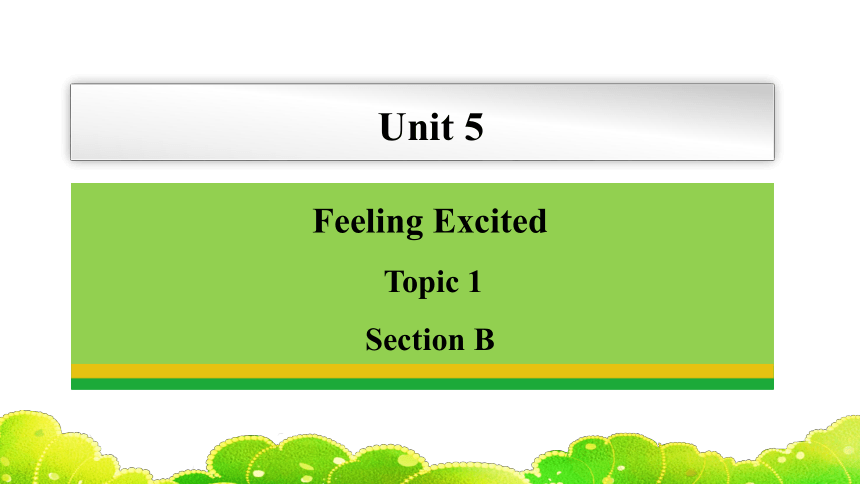
|
|
| 格式 | pptx | ||
| 文件大小 | 10.8MB | ||
| 资源类型 | 教案 | ||
| 版本资源 | 仁爱科普版 | ||
| 科目 | 英语 | ||
| 更新时间 | 2024-03-24 20:24:47 | ||
图片预览

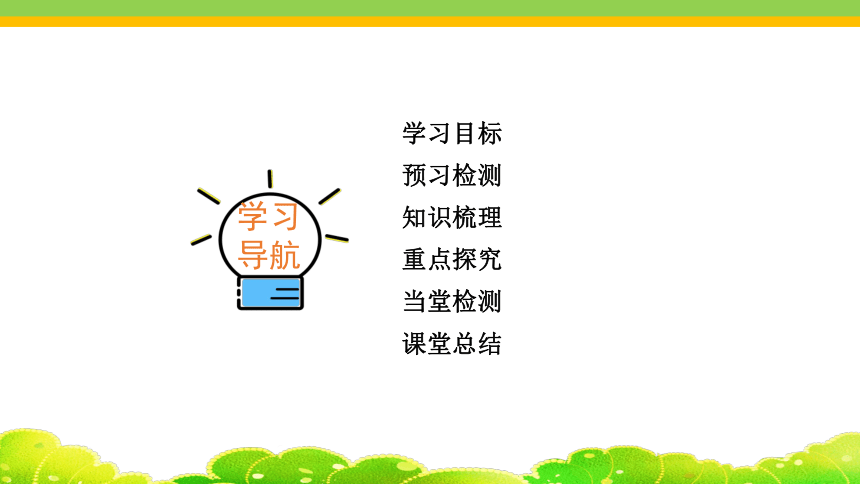
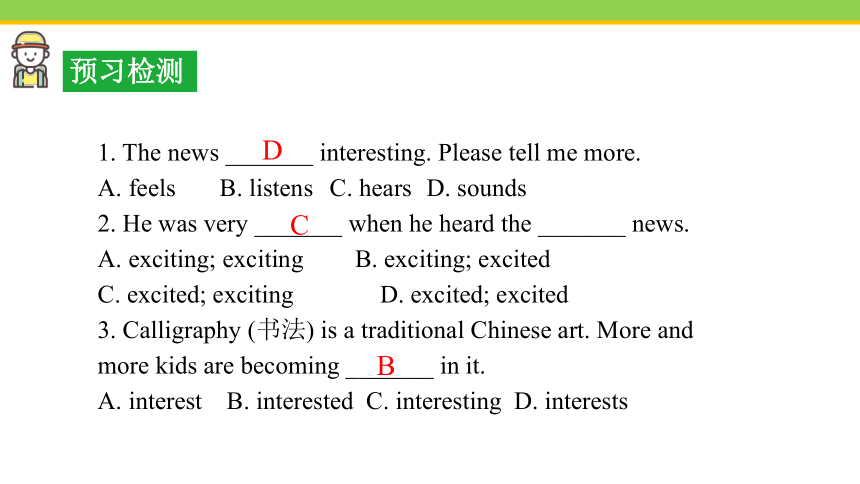
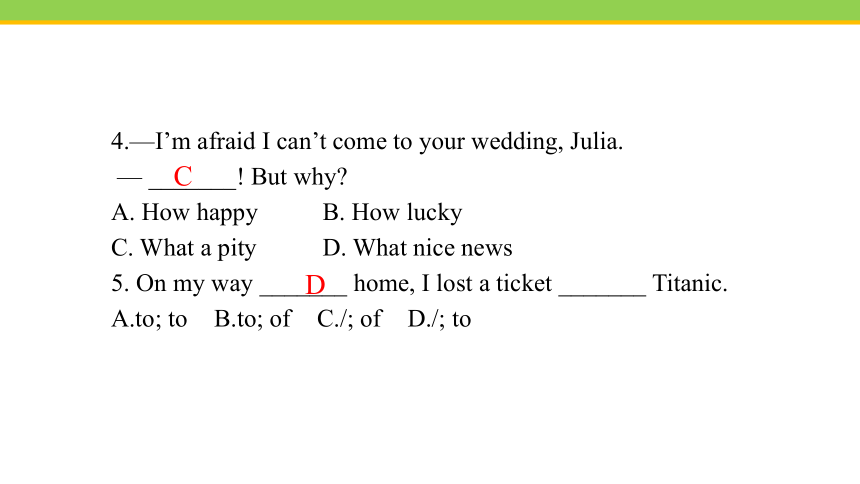

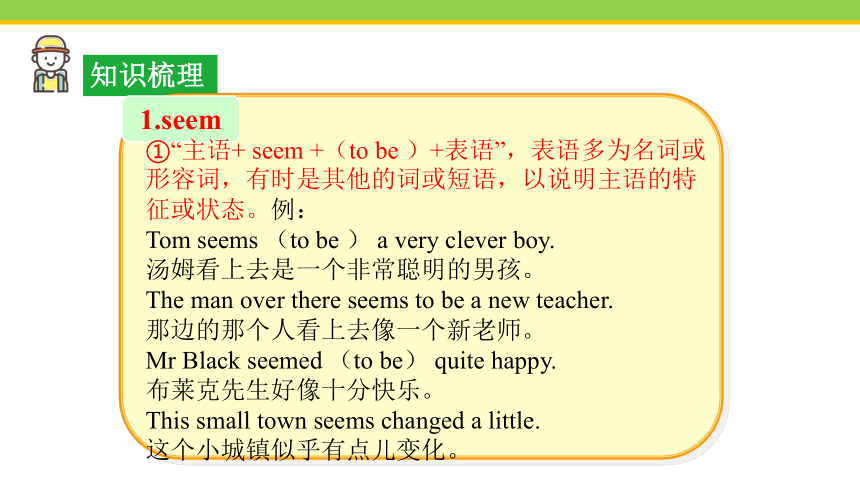
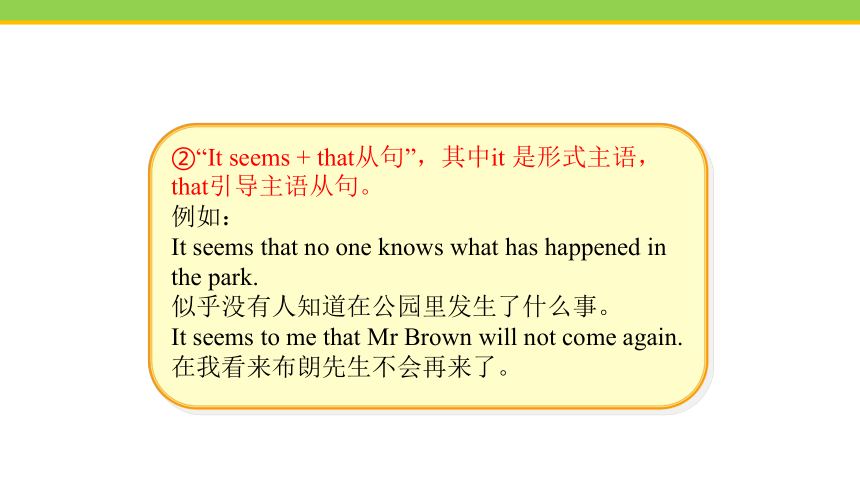
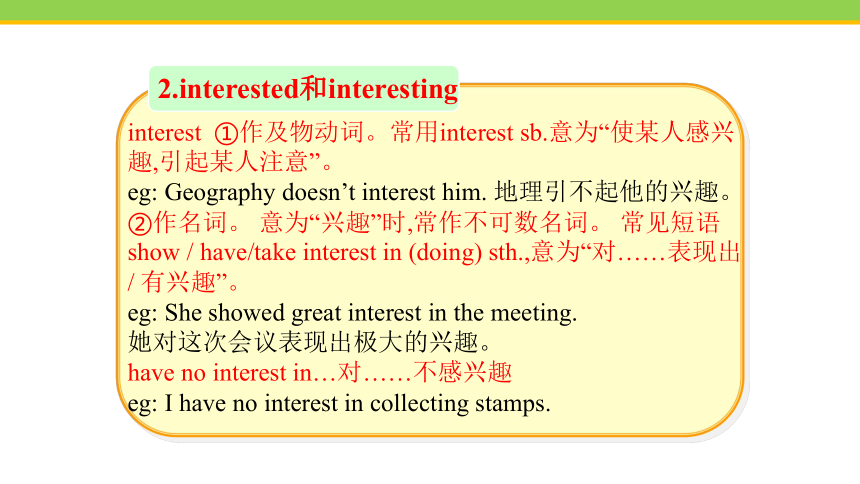
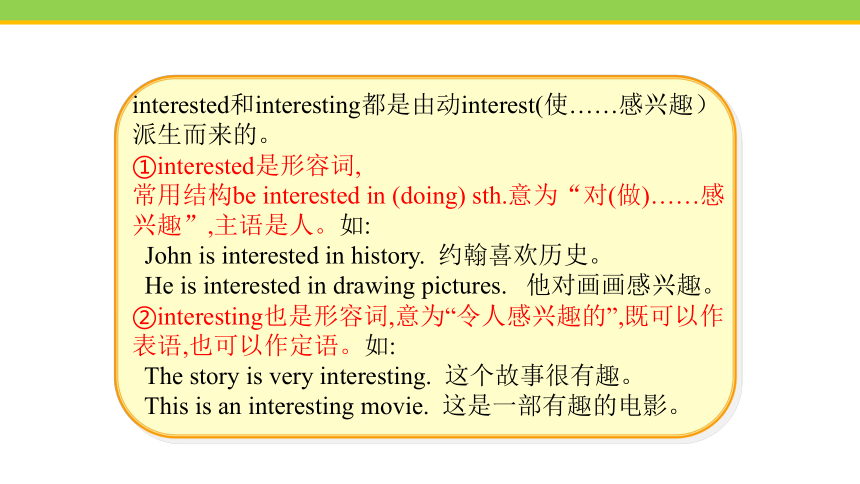
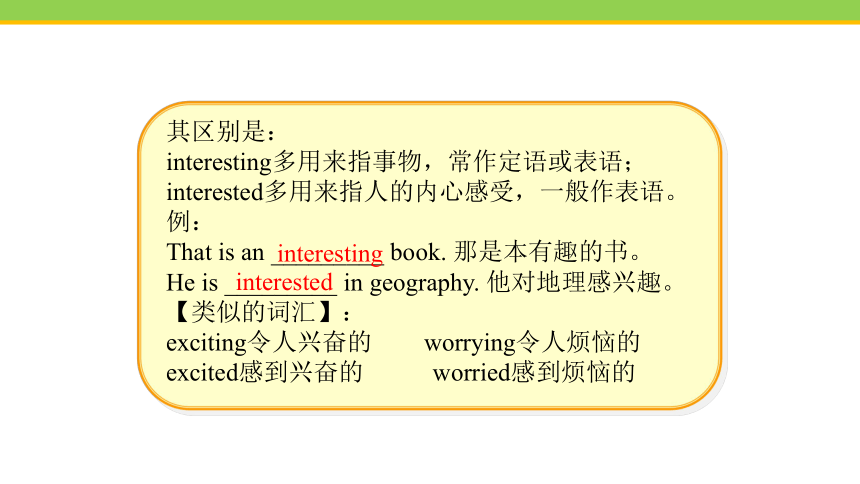

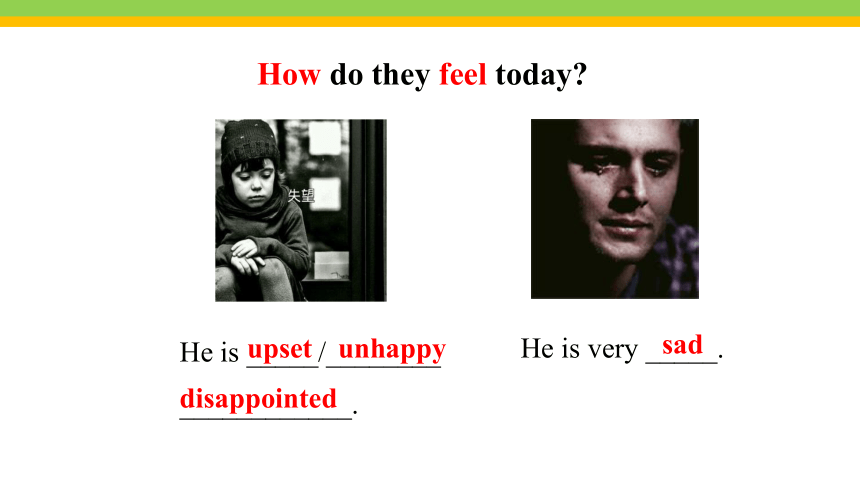
文档简介
(共35张PPT)
Unit 5
Feeling Excited
Topic 1
Section B
学习目标
预习检测
知识梳理
课堂总结
学习
导航
重点探究
当堂检测
1. The news _______ interesting. Please tell me more.
A. feels B. listens C. hears D. sounds
2. He was very _______ when he heard the _______ news.
A. exciting; exciting B. exciting; excited
C. excited; exciting D. excited; excited
3. Calligraphy (书法) is a traditional Chinese art. More and more kids are becoming _______ in it.
A. interest B. interested C. interesting D. interests
D
C
B
预习检测
4.—I’m afraid I can’t come to your wedding, Julia.
— _______! But why
A. How happy B. How lucky
C. What a pity D. What nice news
5. On my way _______ home, I lost a ticket _______ Titanic.
A.to; to B.to; of C./; of D./; to
C
D
能熟悉并正确运用本课时的重点单词和短语
1
2
3
能使用“系动词+形容词”的系表结构表达情绪
能掌握以-ed和-ing结尾的形容词的用法及区别
知识梳理
1.seem
①“主语+ seem +(to be )+表语”,表语多为名词或形容词,有时是其他的词或短语,以说明主语的特征或状态。例:
Tom seems (to be ) a very clever boy.
汤姆看上去是一个非常聪明的男孩。
The man over there seems to be a new teacher.
那边的那个人看上去像一个新老师。
Mr Black seemed (to be) quite happy.
布莱克先生好像十分快乐。
This small town seems changed a little.
这个小城镇似乎有点儿变化。
②“It seems + that从句”,其中it 是形式主语,that引导主语从句。
例如:
It seems that no one knows what has happened in the park.
似乎没有人知道在公园里发生了什么事。
It seems to me that Mr Brown will not come again. 在我看来布朗先生不会再来了。
2.interested和interesting
interest ①作及物动词。常用interest sb.意为“使某人感兴趣,引起某人注意”。
eg: Geography doesn’t interest him. 地理引不起他的兴趣。
②作名词。 意为“兴趣”时,常作不可数名词。 常见短语show / have/take interest in (doing) sth.,意为“对……表现出 / 有兴趣”。
eg: She showed great interest in the meeting.
她对这次会议表现出极大的兴趣。
have no interest in…对……不感兴趣
eg: I have no interest in collecting stamps.
interested和interesting都是由动interest(使……感兴趣)派生而来的。
①interested是形容词,
常用结构be interested in (doing) sth.意为“对(做)……感兴趣”,主语是人。如:
John is interested in history. 约翰喜欢历史。
He is interested in drawing pictures. 他对画画感兴趣。
②interesting也是形容词,意为“令人感兴趣的”,既可以作表语,也可以作定语。如:
The story is very interesting. 这个故事很有趣。
This is an interesting movie. 这是一部有趣的电影。
其区别是:
interesting多用来指事物,常作定语或表语;interested多用来指人的内心感受,一般作表语。
例:
That is an _________ book. 那是本有趣的书。
He is _________ in geography. 他对地理感兴趣。
【类似的词汇】:
exciting令人兴奋的 worrying令人烦恼的
excited感到兴奋的 worried感到烦恼的
interested
interesting
运用系表结构表达情绪
I feel _____.
How do you feel today
重点探究
He is _____/________
____________.
upset
unhappy
He is very _____.
sad
disappointed
How do they feel today
He looks very f________.
rightened
He looks very ______.
angry
He seems to be angry.
seem 似乎,好像
He seems very frightened.
Listen to 1a first and answer these questions.
1. Who seems a little unhappy
Mr. Brown.
2. What does Kangkang like best
The film, Avatar.
1b Listen to 1a and mark T(Ture)orF(False).
1. Mr. Brown couldn’t get a ticket to Avatar, so he was
unhappy. ( )
2. Jane likes the film, The Sound of Music, because it is very
interesting. ( )
3. The opera, Cats, is Maria’s favorite. ( )
4. Kangkang’s parents think that Beijing Opera is boring. ( )
F
F
T
T
1a Look, listen and say.
Steve: Hi, Kangkang! Do you know what's the matter with Mr. Brown He seems a little unhappy.
Kangkang: He feels disappointed because he couldn't get a ticket to The Sound of Music. I think he really wants to watch it.
Jane: I hope he can see the movie next time. It's also my favorite. I think it's very interesting. What about you, Maria
Maria: I love operas. My favorite is Cats. It's so funny and interesting. Kangkang, do you like operas
Kangkang: No, I don't like them at all. They're boring. But my parents like Beijing Opera a lot.
Maria: Then what do you like best
Kangkang: The film, Avatar. It's so exciting.
Group Work
Find out these sentences with the structure of linking verbs+ adj in 1a, and make new sentences with this structure.
Example: He seems a little unhappy.
A: She seems very nervous.
B: The woman seems to be boring.
Match the pictures of their favorite things with the names.
Maria
Jane
Kangkang
Kangkang’s parents
Group Work
Mr. Brown unhappy and disappointed The Sound of Music
Jane also The Sound of Music
Maria Cats funny and interesting
Kangkang's parents Beijing Opera
Kangkang Beijing Opera boring Avatar exciting
1c Work in groups of five and retell 1a according to the following key points. Then link them together to form a passage.
通过以
活动小结
通过以上的活动,Linking verbs+ adj 即连系动词+形容词称为1._________;看起来有点难过可以表达为2._________________________或者3.__________________
系表结构
seem(to be) a little unhappy
look a little unhappy
区分以-ed和-ing结尾的形容词的用法
2a Read the following words, paying attention to the stress and the underlined parts. Then listen and check.
interest
interesting
interested
disap point
disap pointing
disap pointed
worry
worrying
worried
bore
boring
bored
ex cite
ex citing
ex cited
Remembering words in groups can help you learn them better.
2b Fill in the blanks with the correct forms of the given words.
Michael: Hi, Kangkang! This is Michael. I’ve got a bad cold. My mother will stay at home with me.Are you _________
( interest )in her ticket to The Sound of Music
Steve: What a pity! However, I don’t think the movie is __________ ( interest ). Why not give the ticket to Mr. Brown
Michael: Great! He must be ________ (excite) to get it.
Steve: OK, I’ll tell him the ________ (excite) news right now!
exciting
excited
interesting
interested
Group Work
观察2a、2b 中以 -ed和-ing 结尾的形容词,说出它们的区别,并总结规律,分别用以 -ed和-ing 结尾的形容词造句,看看哪个组最优秀。
interested和interesting都是由动词interest(使……感兴趣)派生而来的。
其区别是:
interesting多用来指事物,常作定语或表语;interested多用来指人的内心感受,一般作表语。
3 Listen to the passage and complete the sentences.
1. Mr. Brown was ________ to have a ticket and he also felt sorry for Michael.
2. The music in the movie sounded _________.
3. The parents felt _______ to see the movie together.
4. The children were ______ to have supper at Kangkang’s house. But they felt ______ for Michael.
5. The food smelled _____ and tasted ________.
excited
beautiful
happy
glad
sorry
nice
delicious
4a Read the following words, paying attention to the sounds of the underlined letters. Try to find the rules and add more words.
asked stopped washed
loved learned called
excited interested disappointed
1. : When the pronunciation of the word ends with a voiceless consonant (清辅音).
2. : When the pronunciation of the word ends with a voiced consonant (浊辅音) or vowels(元音).
3. : When the pronunciation of the word ends with /t/ or /d/.
发音规则
a. How are you doing b. What a pity!
c. I don’t like it at all. d. Guess what!
e. We felt ex cited to hear it. f. How did the music sound
4b Read the sentences in the box and pay attention to the stress, liaison and intonation.
The content words such as nouns, verbs, adjectives and interrogative words in a sentence are often stressed.
A: Hi, Kangkang. ___________
B: Very well.___________ Maria and I went to see the opera, Cats, last night.
A: Really You look very happy, so how did you like it
B: We loved it very much because it was so funny.
A: ___________
B: It sounded wonderful. ___________
4 Choose the correct ones to complete the conversation. Then practice it with your partner.
a
d
f
e
a. How are you doing b. What a pity!
c. I don’t like it at all. d. Guess what!
e. We felt ex cited to hear it. f. How did the music sound
通过以
活动小结
通过以上的活动,我们可以知道,以-ed结尾的形容词通常用来修饰1._____,不用于说明事物;以-ing 结尾的形容词主要用于修饰2.______,表示事物的性质或特征。
人
事物
当堂检测
1. Do you like operas (做否定回答)
I ____ _____ them ____ ______.
2. He seems disappointed because he failed in the math
exam .(对划线部分提问)
______ ______ he _____ disappointed
3.The Sound of Music is my favourite movie.(对划线
部分提问)
______ ______ you like ______
一、句型转换。
don’t like at all
Why does seem
What do best
1. The film is exciting/excited.
2. Mr Brown is happy to hear the exciting/excited news.
3. The worrying/worried mother can’t sleep well at night because of her son.
4. We all dislike the boring/bored music.
5. The disappointing/disappoined teacher told us that we couldn't have the hoilday on time.
二、判断各句中形容词的形式应该用v-ed,还是v-ing,并用下划线标注出来。
课堂总结
Unit 5 Topic 1
Section B
重点短语:
unhappy, disappointed, interesting, funny, boring, seem, opera, excite, excited, exciting
以-ed和-ing结尾的形容词的用法:
以-ed结尾的形容词通常用来修饰1.___,不用于说明事物;以-ing 结尾的形容词主要用于修饰2.___,表示事物的性质或特征。
人
物
用系表结构表达情绪:
Linking verbs+ adj 即连系动词+形容词称为1._________;看起来有点难过可以表达为2.______________________或者3.__________________
系表结构
seem(to be) a little unhappy
look a little unhappy
Unit 5
Feeling Excited
Topic 1
Section B
学习目标
预习检测
知识梳理
课堂总结
学习
导航
重点探究
当堂检测
1. The news _______ interesting. Please tell me more.
A. feels B. listens C. hears D. sounds
2. He was very _______ when he heard the _______ news.
A. exciting; exciting B. exciting; excited
C. excited; exciting D. excited; excited
3. Calligraphy (书法) is a traditional Chinese art. More and more kids are becoming _______ in it.
A. interest B. interested C. interesting D. interests
D
C
B
预习检测
4.—I’m afraid I can’t come to your wedding, Julia.
— _______! But why
A. How happy B. How lucky
C. What a pity D. What nice news
5. On my way _______ home, I lost a ticket _______ Titanic.
A.to; to B.to; of C./; of D./; to
C
D
能熟悉并正确运用本课时的重点单词和短语
1
2
3
能使用“系动词+形容词”的系表结构表达情绪
能掌握以-ed和-ing结尾的形容词的用法及区别
知识梳理
1.seem
①“主语+ seem +(to be )+表语”,表语多为名词或形容词,有时是其他的词或短语,以说明主语的特征或状态。例:
Tom seems (to be ) a very clever boy.
汤姆看上去是一个非常聪明的男孩。
The man over there seems to be a new teacher.
那边的那个人看上去像一个新老师。
Mr Black seemed (to be) quite happy.
布莱克先生好像十分快乐。
This small town seems changed a little.
这个小城镇似乎有点儿变化。
②“It seems + that从句”,其中it 是形式主语,that引导主语从句。
例如:
It seems that no one knows what has happened in the park.
似乎没有人知道在公园里发生了什么事。
It seems to me that Mr Brown will not come again. 在我看来布朗先生不会再来了。
2.interested和interesting
interest ①作及物动词。常用interest sb.意为“使某人感兴趣,引起某人注意”。
eg: Geography doesn’t interest him. 地理引不起他的兴趣。
②作名词。 意为“兴趣”时,常作不可数名词。 常见短语show / have/take interest in (doing) sth.,意为“对……表现出 / 有兴趣”。
eg: She showed great interest in the meeting.
她对这次会议表现出极大的兴趣。
have no interest in…对……不感兴趣
eg: I have no interest in collecting stamps.
interested和interesting都是由动interest(使……感兴趣)派生而来的。
①interested是形容词,
常用结构be interested in (doing) sth.意为“对(做)……感兴趣”,主语是人。如:
John is interested in history. 约翰喜欢历史。
He is interested in drawing pictures. 他对画画感兴趣。
②interesting也是形容词,意为“令人感兴趣的”,既可以作表语,也可以作定语。如:
The story is very interesting. 这个故事很有趣。
This is an interesting movie. 这是一部有趣的电影。
其区别是:
interesting多用来指事物,常作定语或表语;interested多用来指人的内心感受,一般作表语。
例:
That is an _________ book. 那是本有趣的书。
He is _________ in geography. 他对地理感兴趣。
【类似的词汇】:
exciting令人兴奋的 worrying令人烦恼的
excited感到兴奋的 worried感到烦恼的
interested
interesting
运用系表结构表达情绪
I feel _____.
How do you feel today
重点探究
He is _____/________
____________.
upset
unhappy
He is very _____.
sad
disappointed
How do they feel today
He looks very f________.
rightened
He looks very ______.
angry
He seems to be angry.
seem 似乎,好像
He seems very frightened.
Listen to 1a first and answer these questions.
1. Who seems a little unhappy
Mr. Brown.
2. What does Kangkang like best
The film, Avatar.
1b Listen to 1a and mark T(Ture)orF(False).
1. Mr. Brown couldn’t get a ticket to Avatar, so he was
unhappy. ( )
2. Jane likes the film, The Sound of Music, because it is very
interesting. ( )
3. The opera, Cats, is Maria’s favorite. ( )
4. Kangkang’s parents think that Beijing Opera is boring. ( )
F
F
T
T
1a Look, listen and say.
Steve: Hi, Kangkang! Do you know what's the matter with Mr. Brown He seems a little unhappy.
Kangkang: He feels disappointed because he couldn't get a ticket to The Sound of Music. I think he really wants to watch it.
Jane: I hope he can see the movie next time. It's also my favorite. I think it's very interesting. What about you, Maria
Maria: I love operas. My favorite is Cats. It's so funny and interesting. Kangkang, do you like operas
Kangkang: No, I don't like them at all. They're boring. But my parents like Beijing Opera a lot.
Maria: Then what do you like best
Kangkang: The film, Avatar. It's so exciting.
Group Work
Find out these sentences with the structure of linking verbs+ adj in 1a, and make new sentences with this structure.
Example: He seems a little unhappy.
A: She seems very nervous.
B: The woman seems to be boring.
Match the pictures of their favorite things with the names.
Maria
Jane
Kangkang
Kangkang’s parents
Group Work
Mr. Brown unhappy and disappointed The Sound of Music
Jane also The Sound of Music
Maria Cats funny and interesting
Kangkang's parents Beijing Opera
Kangkang Beijing Opera boring Avatar exciting
1c Work in groups of five and retell 1a according to the following key points. Then link them together to form a passage.
通过以
活动小结
通过以上的活动,Linking verbs+ adj 即连系动词+形容词称为1._________;看起来有点难过可以表达为2._________________________或者3.__________________
系表结构
seem(to be) a little unhappy
look a little unhappy
区分以-ed和-ing结尾的形容词的用法
2a Read the following words, paying attention to the stress and the underlined parts. Then listen and check.
interest
interesting
interested
disap point
disap pointing
disap pointed
worry
worrying
worried
bore
boring
bored
ex cite
ex citing
ex cited
Remembering words in groups can help you learn them better.
2b Fill in the blanks with the correct forms of the given words.
Michael: Hi, Kangkang! This is Michael. I’ve got a bad cold. My mother will stay at home with me.Are you _________
( interest )in her ticket to The Sound of Music
Steve: What a pity! However, I don’t think the movie is __________ ( interest ). Why not give the ticket to Mr. Brown
Michael: Great! He must be ________ (excite) to get it.
Steve: OK, I’ll tell him the ________ (excite) news right now!
exciting
excited
interesting
interested
Group Work
观察2a、2b 中以 -ed和-ing 结尾的形容词,说出它们的区别,并总结规律,分别用以 -ed和-ing 结尾的形容词造句,看看哪个组最优秀。
interested和interesting都是由动词interest(使……感兴趣)派生而来的。
其区别是:
interesting多用来指事物,常作定语或表语;interested多用来指人的内心感受,一般作表语。
3 Listen to the passage and complete the sentences.
1. Mr. Brown was ________ to have a ticket and he also felt sorry for Michael.
2. The music in the movie sounded _________.
3. The parents felt _______ to see the movie together.
4. The children were ______ to have supper at Kangkang’s house. But they felt ______ for Michael.
5. The food smelled _____ and tasted ________.
excited
beautiful
happy
glad
sorry
nice
delicious
4a Read the following words, paying attention to the sounds of the underlined letters. Try to find the rules and add more words.
asked stopped washed
loved learned called
excited interested disappointed
1. : When the pronunciation of the word ends with a voiceless consonant (清辅音).
2. : When the pronunciation of the word ends with a voiced consonant (浊辅音) or vowels(元音).
3. : When the pronunciation of the word ends with /t/ or /d/.
发音规则
a. How are you doing b. What a pity!
c. I don’t like it at all. d. Guess what!
e. We felt ex cited to hear it. f. How did the music sound
4b Read the sentences in the box and pay attention to the stress, liaison and intonation.
The content words such as nouns, verbs, adjectives and interrogative words in a sentence are often stressed.
A: Hi, Kangkang. ___________
B: Very well.___________ Maria and I went to see the opera, Cats, last night.
A: Really You look very happy, so how did you like it
B: We loved it very much because it was so funny.
A: ___________
B: It sounded wonderful. ___________
4 Choose the correct ones to complete the conversation. Then practice it with your partner.
a
d
f
e
a. How are you doing b. What a pity!
c. I don’t like it at all. d. Guess what!
e. We felt ex cited to hear it. f. How did the music sound
通过以
活动小结
通过以上的活动,我们可以知道,以-ed结尾的形容词通常用来修饰1._____,不用于说明事物;以-ing 结尾的形容词主要用于修饰2.______,表示事物的性质或特征。
人
事物
当堂检测
1. Do you like operas (做否定回答)
I ____ _____ them ____ ______.
2. He seems disappointed because he failed in the math
exam .(对划线部分提问)
______ ______ he _____ disappointed
3.The Sound of Music is my favourite movie.(对划线
部分提问)
______ ______ you like ______
一、句型转换。
don’t like at all
Why does seem
What do best
1. The film is exciting/excited.
2. Mr Brown is happy to hear the exciting/excited news.
3. The worrying/worried mother can’t sleep well at night because of her son.
4. We all dislike the boring/bored music.
5. The disappointing/disappoined teacher told us that we couldn't have the hoilday on time.
二、判断各句中形容词的形式应该用v-ed,还是v-ing,并用下划线标注出来。
课堂总结
Unit 5 Topic 1
Section B
重点短语:
unhappy, disappointed, interesting, funny, boring, seem, opera, excite, excited, exciting
以-ed和-ing结尾的形容词的用法:
以-ed结尾的形容词通常用来修饰1.___,不用于说明事物;以-ing 结尾的形容词主要用于修饰2.___,表示事物的性质或特征。
人
物
用系表结构表达情绪:
Linking verbs+ adj 即连系动词+形容词称为1._________;看起来有点难过可以表达为2.______________________或者3.__________________
系表结构
seem(to be) a little unhappy
look a little unhappy
同课章节目录
- Unit 5 Feeling excited
- Topic 1 You look excited
- Topic 2 I’m feeling better now.
- Topic 3 Many things can affect our feelings.
- Unit 6 Enjoying Cycling
- Topic 1 We're going on a three-day visit to Mount
- Topic 2 How about exploring Tian’anmen Square?
- Topic 3 Bicycle riding is good exercise.
- Unit 7 Food festival
- Topic 1 We’re preparing for a food festival.
- Topic 2 I’m not sure whether I can cook it well.
- Topic 3 I Cooked the Most Successfully
- Unit 8 Our Clothes
- Topic 1 We will have a class fashion show.
- Topic 2 We can design our own uniforms.
- Topic 3 He said the fashion show was wonderful.
